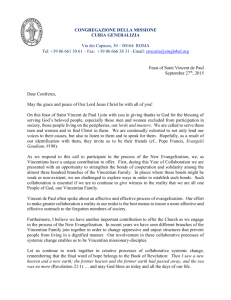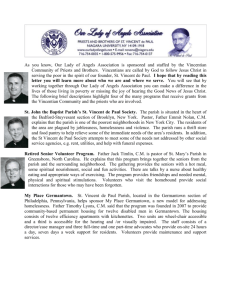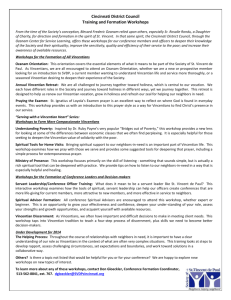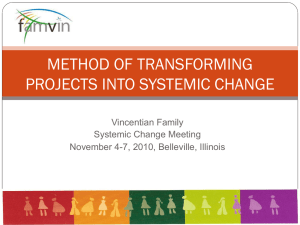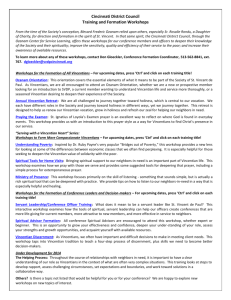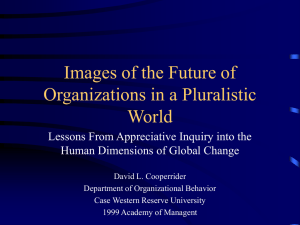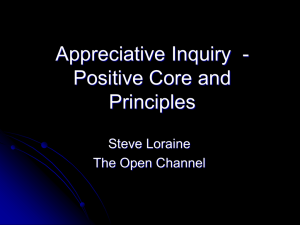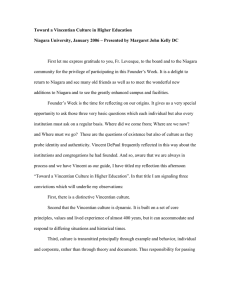PowerPoint Presentation - Jack Lane
advertisement
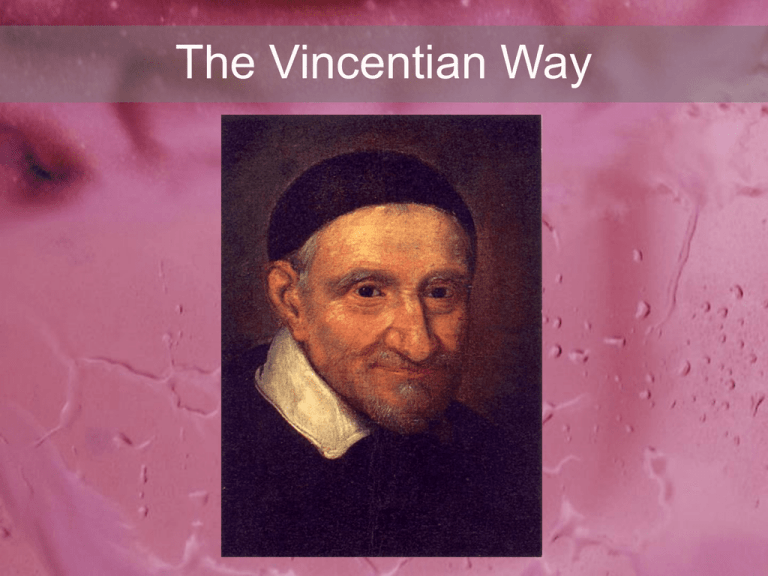
The Vincentian Way Introduction No single discipline—philosophy, psychology, history, political science—alone can deal adequately with the phenomenon of causation because the subject lies outside as well as inside every discipline. A multidiscipline is necessary to borrow from and synthesize existing intellectual resources, and to generate new ones in the process, a discipline using the widest array of conceptual and empirical tools. That discipline is leadership—the X factor in historic causation (James MacGregor Burns, 2003) The poor are still with us; the laborers are few. Some Choices • Go with the demographics and close down at the nadir • Trust in Providence to send replacements • Work with Providence • Succession Planning What to do Before and During Succession Planning 1. Determine which activities and agencies can and should continue- assumes criteria 2. Find ways to shift responsibility to lay people without losing the spirit, values, and charismas that have guided our institutions for years, even centuries 3. Develop new ways to develop Vincentian leaders, evangelize the poor, recruit others to the cause, resist and fight systems and gain financial support. Three Working Assumptions 1. There is a “Vincentian Difference,” but it must be made more explicit and relevant to the 21st century. 2. Not all organizations deserve to survive. 3. Vincentian institutions stand for quality—aspiring to be the best hospital, university, or social agency. Vincentian is not a substitute for excellence; it is the hallmark of excellence. Five Key Questions 1. What distinguishes Vincentian-inspired institutions from others performing the same kinds of services? 2. Assuming there is a Vincentian institutional difference, is it substantive, that is capable of making a positive difference in peoples’ lives, especially the lives of the poor? 3. Is it worth studying, preserving, and reinterpreting for different times, cultures, and institutional types? 1. What should happen to an institution that fails to live up to its Vincentian heritage? 2. How shall we attract and develop new generations of servant leaders to the cause of the poor? Appreciative Inquiry & Tipping Point Theory Two Leadership Tools Available to Us To Help Before and During Succession Planning “Appreciative Inquiry is a form of organizational study that selectively seeks to locate, highlight, and illuminate the life giving forces of a firm’s existence.” It is rooted in action research, leadership theory, and OD. Tipping Point is “that magic moment when an idea, trend or social behavior crosses a threshold, tips and spreads like wildfire.” It originates from psychology, epidemiology, sociology, and business. Appreciative Inquiry: complements and extends action-research used in social sciences, community action, educational reform, and organizational change research. AI connects organizations to what is good about them—every strength, innovation, positive tradition, passion and dream-- through systematic inquiry. AI seeks to find what gives life to an organization. The single most important thing a group can do if its aims are to liberate the human spirit and consciously construct a better future is to make the positive change core the common explicit property of all. The Vincentian Family seeks to make the Vincentian Way the explicit property of all. Insights into the Appreciative Inquiry Process AI is based on the premise that human systems grow and construct their future realities in the direction of what they most persistently, actively, and collectively ask about. Representative Questions 1. Think of time in your entire experience with, say, university, hospital, or social agency when you felt most engaged and most alive. What forces or factors made it a great or even a peak experience? 2. What do you value most about yourself, your work, and your organization? 3. What is the core factor that “gives life” to your organization? Alternatively, what is the most productive partnership in which you have been involved? 4. What are the three most important hopes and aspirations you have for your organization’s future? The question process cycles through four stages—the 4D process: Discovery, Dream, Design, and Delivery Tipping Point Theory Basic Concept: Ideas and products and messages and behaviors spread just like viruses do. Three Rules Must be Followed 1. The Law of the Few 2. The Stickiness Factor 3. The Power of Context The Law of the Few includes: (Who) CONNECTORS who know a lot of people MAVENS who have a lot of information to share unselfishly SALESPERSONS who are talented at persuading others. They are people persons with great nonverbal skills The FEW are the people who translate ideas of Innovators like Vincent, Louise, and Ozanam, drop some details of the message, exaggerate others to make the message meaningful, something the rest of us understand. The Stickiness Factor (What) There is a simple way to package information that makes it more memorable and, under the right circumstances, can make it almost irresistible. The Power of Context I The power of context is an environmental argument. It says that behavior is often a function of social context, and That our so-called “inner states” are powerfully influenced be subtle, seemingly inconsequential personal influences of others. The Power of Context II Gladwell supports the notion that the maximum number of individuals with whom we can have a genuinely social relationship is 150 This ideal-sized groups serve as incubators for contagious messages Summary The Law of the Few looks at the kinds of people who are critical to spreading information. There is enormous power in word of mouth messages. The Stickiness Factor says that to spark an epidemic ideas have to be memorable and move us to action. The Power of Context says that epidemics are sensitive to the conditions and circumstances of the times and places in which they occur. (Gladwell, p. 139) What is the essence of the Vincentian Way? How is it manifest in people and in Vincentian-inspired organizations? What is Vincentian Leadership? (Would Appreciative Inquiry be helpful?) How shall we understand and translate the Vincentian Way to others in the hope of attracting them to the cause of the poor?
